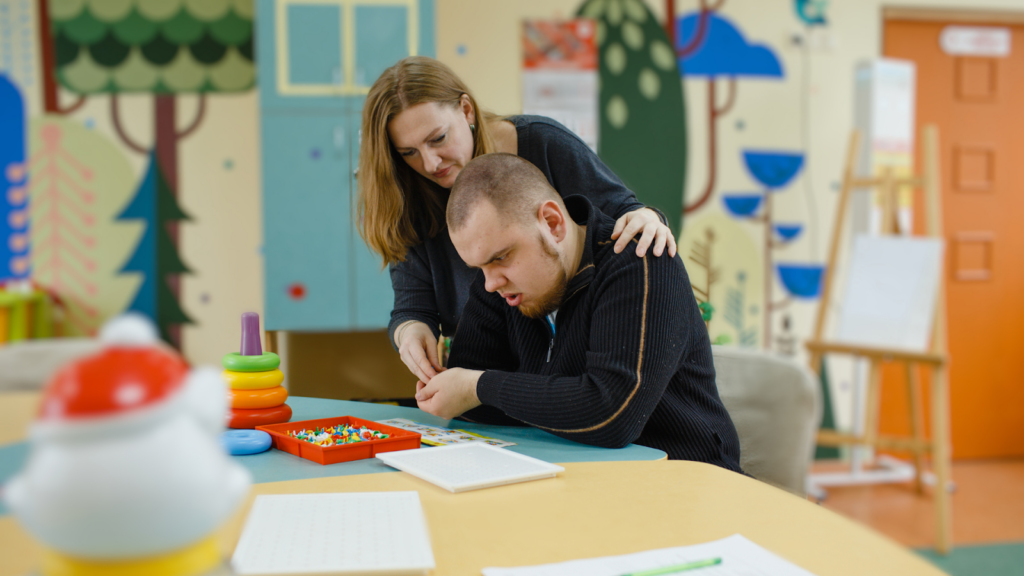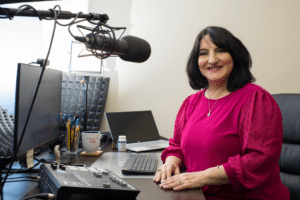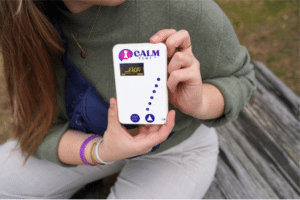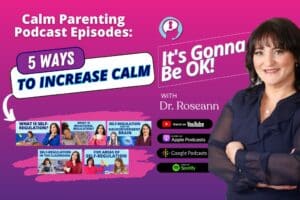In our beautifully diverse world, each child adds a unique brushstroke to the canvas of humanity. With neurodivergence on the rise Autism Spectrum Disorders (ASD) in children are becoming increasingly common.
ASD is a neurodevelopmental disorder that presents a spectrum of complexities that can profoundly shape communication, behavior, and social connections. As parents of autistic children with extraordinary young souls, know that your voyage is written in strength, endurance, and an unbreakable bond of love.
Indeed, autism is more than a mental health disorder. It's a complex weave of diverse strengths, unique quirks, and potential. From the child who finds solace in structure and order to the teen who communicates through art, every person with autism exists at least partially in a universe all their own.
But as each autistic child or teen's journey is unique, their challenges often include difficulties in understanding social cues, processing sensory stimuli, and navigating the nuances of communication.
Imagine autism as a prism—its facets are as diverse as the children and teens it touches. Whether your child has just been diagnosed or you're seeking new avenues to support their growth, the journey will be marked by hope, exploration, and a relentless pursuit of the best quality of life.
Introduction to Biomedical Treatment for Autism
In raising children and teens who wear the label of autism with grace, it's time we shed light on a promising solution: biomedical treatment. Before you ask what it is, let me assure you it's not your run-of-the-mill, cookie-cutter approach.
As autistic children have unique traits, strengths, and a journey entirely their own, biomedical treatment flips the script on traditional medical approaches by embracing the marvels of customization. No two children or teens with autism are identical, so their treatment plans shouldn't be either.
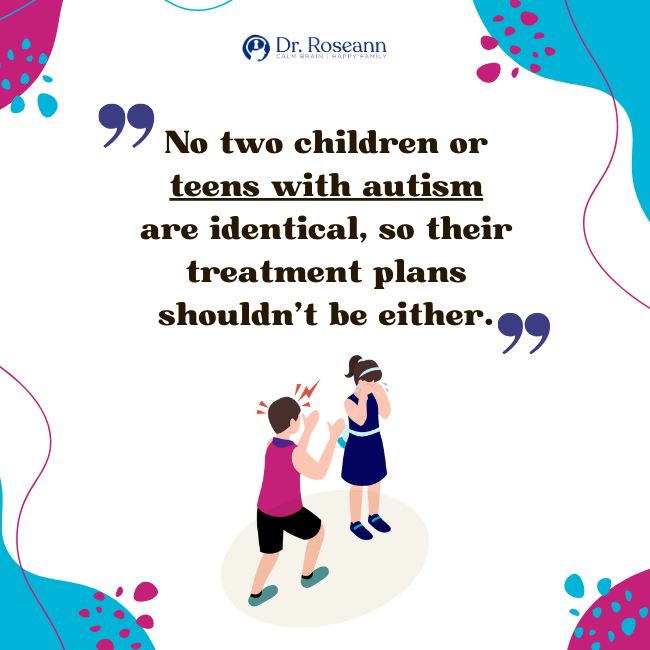
Biomedical treatment gets down to the tacks, delving deep into the biology of your child's body. It isn't about patching up the surface. It's about unearthing the root causes of your child's mental and physical challenges.
Biomedical treatment addresses any nutritional deficiency that interferes with your child's brain health. It identifies those elusive vitamins, minerals, and fatty acids that play a role in brain development, mood regulation, and overall well-being. But it continues beyond identifying the supplements needed. It also crafts a personalized treatment plan to meet your child's needs and deficiencies.
The Role of Nutritional Deficiencies in Autism
When discussing the health of autistic children and teens, expect many nutritional twists and turns. Learning how vitamins, minerals, and fatty acids affect brain health is the first step to biological treatment.
Nutritional deficiencies can slip in and disrupt the normal functions of the brain and body. Certain nutrients might seem like minor players, but their absence can cause quite the commotion, affecting brain function, mood regulation, and behavior.
Studies show that vitamins, minerals, or fatty acids play a role in intricate brain development (Adams et al., 2011). Vitamins like B Vitamins, folic acid, and Vitamin D, minerals like magnesium and zinc, and fatty acids like omega-3s are essential players in the development and functioning of a child's brain. When these nutrients are in short supply, more significant problems occur.
Nutritional deficiencies can impact various physiological processes. For instance, specific vitamins and minerals are vital in producing neurotransmitters or the brain's messengers. Such neurotransmitters, like GABA, transmit messages between brain cells, influencing mood, behavior, and communication skills (Lemonnier et al., 2012).
Here's where biomedical treatment comes in. This approach doesn't just slap on some generic multivitamins and call it a day. It’s more about understanding your child's unique nutritional needs and crafting a personalized plan to bridge those gaps. It may involve specialized diets, dietary supplements, and even digestive enzymes to ensure those nutrients are properly absorbed and utilized.
Nutritional deficiencies can mess with the immune system's delicate balance, causing immune dysfunction with a ripple effect throughout the body. So, by tackling these deficiencies, we're nourishing the brain and aiding the body's defense mechanisms.
While nutrition supplementation may sound easy, it requires careful consideration. Blood tests and dietary changes are often necessary. But when done correctly, its potential benefits include improved mood, attention, and brain function. Biomedical treatment is like embarking on a quest to uncover and address your child’s nutritional deficiencies, one nutrient at a time.
How Biomedical Treatment Addresses Nutritional Deficiencies
The role of biomedical treatment in addressing nutritional deficiencies is creating a treatment plan that suits your child's unique needs through precision and customization. Just as no two flowers are identical, no two children with autism spectrum disorder are similar, and their nutrient requirements vary.
Biomedical treatment works to understand the physiological nuances of your child's body and craft a plan that fits them like a well-tailored suit. Included in this treatment there may be specialized diets that eliminate trigger foods, dietary supplements that replenish missing nutrients, and digestive enzymes to ensure proper absorption.
Biomedical therapy doesn't just look at surface issues. It digs deep to uncover the hidden clues that might be causing those nutritional gaps. Blood tests become the magnifying glass, revealing what's missing or in excess.
We're not just talking about adding vitamins and minerals here, but also amino acids, essential fatty acids, and even antioxidants that combat oxidative stress. It isn't just about brain health either. It's about supporting every nook and cranny of your child's being and functioning.
Identifying and Addressing Underlying Medical Issues in Individuals with Autism
Autism is much like an iceberg—the tip you see is just a fraction of the story. Deep beneath the surface lie potential medical conditions, metabolic imbalances, and immune system anomalies that could influence your child's journey.
The medical makeup of autistic children is as distinct as their presentations. Biomedical treatment acknowledges this diversity and zooms in on the individual. It's about asking questions, listening to the whispers of the body, and piecing together the puzzle of medical issues that might complicate your child's path.
Biomedical treatments begin with a comprehensive evaluation and data gathering through laboratory tests, medical history, and physical assessment. We're looking at potential digestive enzyme abnormalities, metabolic dysfunction, and immune system hiccups that might be flying under the radar. These seemingly unrelated elements can influence your child's behavior, mood, and cognitive function. The biomedical approach identifies the underlying issues and takes action.
The Impact of Heavy Metal Toxicity on Autism Symptoms
Heavy metals, like uninvited guests at a party, sneak into the body and disrupt the harmony. These troublemakers, such as lead, mercury, and arsenic, aren't content with making a cameo appearance. They often take the spotlight, wreaking havoc on physiological processes and potentially worsening autism symptoms.
Heavy metals can interfere with neurotransmitter function, mess with the immune system's equilibrium, and even affect mitochondrial health. These factors contribute to the bigger picture of autism treatment options and symptoms.
Chelation therapy helps remove these unwanted metals from your child's body, easing the burden on their system and potentially alleviating some of their challenges. But let's not forget about oxidative stress. Heavy metals, with their disruptive antics, can fan the flames of oxidative stress, which lead to cellular damage and inflammation.
Biomedical treatment doesn't just stop at heavy metal removal. It's about restoring balance, reducing inflammation, and giving your child's system a much-needed breath of fresh air. Through targeted strategies, dietary changes, and detoxification, it aims to silence the uproar caused by heavy metal toxicity.
Reducing Oxidative Stress Through Biomedical Treatment
Oxidative stress produces free radicals, or the molecules that wreak havoc on the body's cells. The impact of oxidative stress in autism can be particularly significant as every cell's role is magnified (Rossignol & Frye, 2011).
If you think of your child's cells as a cityscape with bustling streets and thriving communities, then oxidative stress is like smog that blankets the city. It impairs traffic flow, interrupts communication, and causes chaos. In autism, this chaos can manifest as worsened symptoms of behavior, mood, and cognitive function challenges.
Biomedical treatment takes on the challenge of reducing oxidative stress head-on through a strategic blend of nutritional interventions, dietary changes, and targeted therapies. This approach isn't about masking symptoms or a mere Band-Aid solution but seeks to address the root cause.
It introduces antioxidant reinforcements to fend off the damaging effects of free radicals. It bolsters the body's defense mechanisms and restores harmony within the cellular city through specialized dietary plans, antioxidant-rich foods, and supplements like Vitamin C.
The Benefits and Potential Side Effects of Biomedical Treatment
Biomedical treatment offers potential benefits, such as improved communication skills, enhanced social interactions, and reduced repetitive behaviors. It involves personalized interventions that address nutritional deficiencies and tackle underlying medical issues.
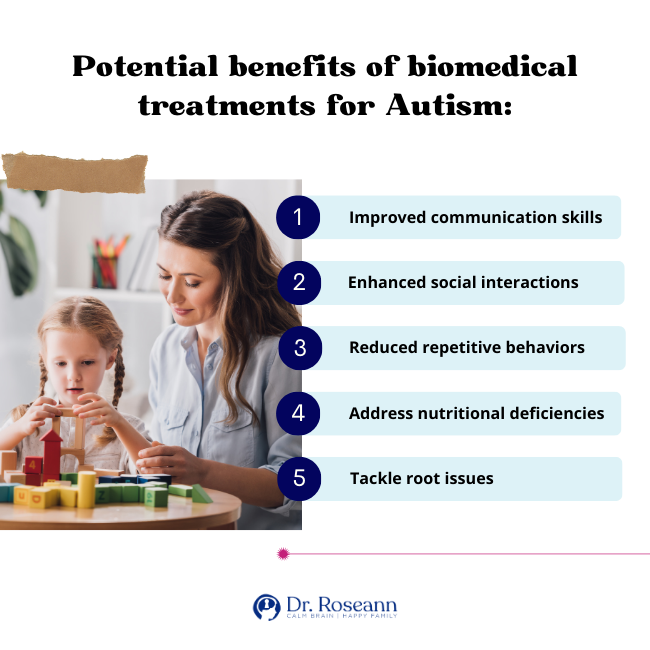
After a successful biomedical treatment, an autistic child may finally make eye contact. Autistic teens can manage stress better, and the whole family may experience a greater sense of harmony.
But just like any journey, this one comes with its share of twists and turns. So, it's essential to approach this aspect with a realistic outlook. Some children might experience temporary adjustments as their bodies adapt to changes, while others might encounter challenges that need careful monitoring and adjustment.
Guidance from a doctor well-versed in the nuances of biomedical treatment can tremendously help. They address concerns, fine-tune strategies, and smooth the journey. It's all about achieving balance, weighing the potential benefits against the possible side effects, making informed decisions, and embracing the process with open arms.
Success Story of Individuals Who Have Undergone Biomedical Treatment
Allow me to introduce you to Lily, a spirited young girl whose journey vividly portrays what's possible. Lily is an energetic 8-year-old who has been navigating autism with her family for many years.
Her challenges were like riddles waiting to be solved, and her potential was a beacon that guided them forward. With a heart full of hope, Lily's family began a journey that eventually led them to the doors of biomedical treatment.
Before the journey began, Lily's communication was limited, and social interactions were a struggle. But her family sought answers beyond the surface. Biomedical treatment became their ally as it unraveled the mysteries beneath the symptoms and unveiled a path to progress.
Through targeted interventions, Lily's nutrient deficiencies were addressed with personalized precision. Her diet included various vitamins, minerals, and fatty acids to support her brain's needs. Slowly but surely, Lily's communication began to flourish, her eye contact deepened, and her mood transformed into a brighter shade.
But the journey wasn't without its moments of uncertainty. Lily's family navigated potential side effects with the steady guidance of her doctor. They observed her responses, tweaked strategies, and held onto the promise that the road to progress was paved with dedication and love.
And the results? Lily's journey speaks volumes. Her success story isn't merely a tale but a testament to biomedical treatment's power. Lily's world expanded, her challenges transformed into stepping stones, and her potential blossomed. Improved social skills, reduced repetitive behaviors, and an enhanced sense of well-being were the brushstrokes that painted Lily's portrait of triumph.
Lily's story reminds us that success isn't always measured in grand leaps. It's in the small steps forward: the milestones reached and the blossoming of potential that was once hidden. Biomedical treatment acted as a catalyst, a partner in Lily's journey toward a brighter future.
Combining Biomedical Treatment with Autism Natural Solutions
Biomedical treatment isn't just a solo act but a collaboration that combines with other therapies to create a more complete support system. Each approach has its role in the grand ensemble, from speech and occupational therapy to behavioral interventions and sensory integration.
Integrating therapies, like the BrainBehaviorResetTM Program, provides strategies to build a foundation that supports every facet of your child's growth. While biomedical interventions offer a nutritional foundation, brain health support, and overall wellness, behavioral therapy shapes behavior, communication therapy enhances social skills, and sensory integration promotes sensory regulation. Neurofeedback and PEMF can also help prevent the use of prescription drugs for autism.
Remember that this journey is a tapestry, a synergy of approaches that work harmoniously to support your child's growth. Through collaboration, communication, and an unwavering commitment to your child's well-being, we're crafting a masterpiece that reflects challenges, triumphs, resilience, and the boundless promise of a life encircled by love and care.
Parent Action Steps
☐ Empower yourself with knowledge about autism.
☐ Reach out to healthcare professionals experienced in biomedical treatment for autism.
☐ Identify potential nutritional deficiencies through blood tests and assessments.
☐ Identify any underlying medical issues impacting the symptoms of autism.
☐ Consult your healthcare provider if you suspect heavy metal toxicity.
☐ Embrace a dietary approach rich in antioxidants to reduce oxidative stress.
☐ Know the potential benefits and side effects of biomedical treatments.
☐ Regularly monitor your child's progress and response to biomedical treatment
☐ Integrate biomedical treatment with other therapies
☐ Acknowledge and celebrate each step forward in your child's journey.
☐ Download The Ultimate Guide to Boosting Neurotransmitters Naturally.
☐ Take our Solutions Matcher to get personalized treatment for your child.
Citations
Adams, J. B., Audhya, T., McDonough-Means, S., Rubin, R. A., Quig, D., Geis, E., Gehn, E., Loresto, M., Mitchell, J., Atwood, S., Barnhouse, S., & Lee, W. (2011). Nutritional and metabolic status of children with autism vs. neurotypical children, and the association with autism severity. Nutrition & Metabolism, 8(1), 34. https://doi.org/10.1186/1743-7075-8-34
Lemonnier, E., Degrez, C., Phelep, M., Tyzio, R., Josse, F., Grandgeorge, M., Hadjikhani, N., & Ben-Ari, Y. (2012). A randomised controlled trial of bumetanide in the treatment of autism in children. Translational Psychiatry, 2(12), e202–e202. https://doi.org/10.1038/tp.2012.124
Rossignol, D. A., & Frye, R. E. (2011). A review of research trends in physiological abnormalities in autism spectrum disorders: immune dysregulation, inflammation, oxidative stress, mitochondrial dysfunction and environmental toxicant exposures. Molecular Psychiatry, 17(4), 389–401. https://doi.org/10.1038/mp.2011.165
Are you looking for SOLUTIONS for your struggling child or teen?
Dr. Roseann and her team are all about science-backed solutions, so you are in the right place!
Learn more about Dr. Roseann’s meticulously designed first-of-its-kind supplement line, the Neurotastic™ Multi-Mag Brain™ Formula
Empower yourself with natural solutions for your child's mental health and behavior. Download our FREE quick start guide and start supporting your child today.
You can get her books for parents and professionals, including: It’s Gonna Be OK™: Proven Ways to Improve Your Child’s Mental Health, Teletherapy Toolkit™ and Brain Under Attack: A Resource For Parents and Caregivers of Children With PANS, PANDAS, and Autoimmune Encephalopathy.
If you are a business or organization that needs proactive guidance to support employee mental health or an organization looking for a brand representative, check out Dr. Roseann’s professional speaking page to see how we can work together.
Dr. Roseann is a Children’s Mental Health Expert and Therapist who has been featured in/on hundreds of media outlets including, CBS, NBC, FOX News, PIX11 NYC, The New York Times, The Washington Post, Business Insider, USA Today, CNET, Marth Stewart, and PARENTS. FORBES called her, “A thought leader in children’s mental health.”

She is the founder and director of The Global Institute of Children’s Mental Health and Dr. Roseann Capanna-Hodge, LLC. Dr. Roseann is a Board Certified Neurofeedback (BCN) Practitioner, a Board Member of the Northeast Region Biofeedback Society (NRBS), Certified Integrative Mental Health Professional (CIMHP) and an Amen Clinic Certified Brain Health Coach. She is also a member of The International Lyme Disease and Associated Disease Society (ILADS), The American Psychological Association (APA), Anxiety and Depression Association of America (ADAA) National Association of School Psychologists (NASP), International OCD Foundation (IOCDF) International Society for Neurofeedback and Research (ISNR) and The Association of Applied Psychophysiology and Biofeedback (AAPB).
© Roseann-Capanna-Hodge, LLC 2023

